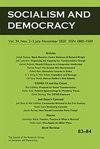社会主义改良主义的教训:重新审视德国、瑞典和法国的社会民主主义
Q4 Social Sciences
引用次数: 0
摘要
为了通过议会和非革命战略实现社会主义,社会民主主义政党最初受到马克思主义社会主义发展观和阶级斗争观的启发,逐渐与社会主义保持距离,接受自由主义甚至新自由主义观点。对于狂热革命战略的支持者来说,造成这种巨大分歧的原因仅仅是“机会主义者”和“叛徒”接管了社会主义运动。但原因要复杂得多,它与资本主义的持续扩张及其在全球的主导地位、工人阶级的持续弱势、新兴中产阶级的崛起以及改革派在与资本对抗时无法采取正确政策有关。本文回顾了改良主义理论和社会主义改良主义运动的重要案例,讨论了社会民主党面临的各种障碍,以及他们对变化的环境的反应性政策。文章认为,虽然在从资本主义过渡的漫长过程中,激进的社会主义改良主义而不是革命的狂热战略是社会主义者唯一可能的选择,但面对巨大的客观和主观障碍,社会主义代理人的被动和失败主义政策未能吸引工人阶级、新兴中产阶级和认同群体的支持,也未能找到向后资本主义社会前进的适当战略。本文章由计算机程序翻译,如有差异,请以英文原文为准。
Lessons of Socialist Reformisms: Revisiting the German, Swedish, and French Social Democracies
In hopes of attaining socialism through parliamentary and nonrevolutionary strategies, social democratic parties initially inspired by a Marxian socialist view of development and class struggle gradually distanced themselves from socialism and embraced liberal and even neo-liberal perspectives. For the proponents of a revolutionary rapturous strategy, the cause of this huge divergence was simply the takeover of socialist movements by “opportunists” and “renegades.” But the reasons were far more complicated, having to do with the continued expansion of capitalism and its global dominance, the unceasing weakness of the working class, the rise of new middle classes, and the inability of reformist agents to adopt the right policies in their confrontations with capital. Reviewing reformist theories and important cases of socialist reformist movements, this article discusses the diverse obstacles that social democratic parties faced, and their reactive policies to changing circumstances. It argues that while in the long process of the transition from capitalism, radical socialist reformism and not a revolutionary rapturous strategy was the only possible option for the socialists, in face of enormous objective and subjective obstacles, the reactive and defeatist policies of the socialist agents failed to attract the support of the working class, the rising middle class, and identitarian groups, and to find the proper strategy for advancing towards a post-capitalist society.
求助全文
通过发布文献求助,成功后即可免费获取论文全文。
去求助
来源期刊

Socialism and Democracy
Social Sciences-Sociology and Political Science
CiteScore
0.50
自引率
0.00%
发文量
34
期刊介绍:
Socialism and Democracy is committed to showing the continuing relevance of socialist politics and vision. Socialism and Democracy brings together the worlds of scholarship and activism, theory and practice, to examine in depth the core issues and popular movements of our time. The perspective is broadly Marxist, encouraging not only critique of the status quo, but also informed analysis of the many different approaches to bringing about fundamental change, and seeking to integrate issues of race, gender, sexuality, ethnicity and nationality with the traditional focus on class. Articles reflect many disciplines; our geographical scope is global; authors include activists and independent scholars as well as academics.
 求助内容:
求助内容: 应助结果提醒方式:
应助结果提醒方式:


